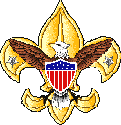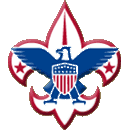| MERIT BADGES |
|
|
|
|
| Note: Eagle Required are in Italics |
"A"
American
Business
American Culture
American Heritage
American Labor
Animal Science
Archaeology
Archery
Architecture
Art
Astronomy
Athletics
Atomic Energy
Auto Mechanics
Aviation
"B"
Backpacking
Basketry
Bird Study
Bugling
"C"
Camping
Canoeing
Chemistry
Cinematography
Citizenship
Community*
Citizenship Nation*
Citizenship World*
Climbing
Coin Collecting
Collections
Communications*
Computers
Cooking
Crime Prevention
Cycling*
"D"
Dentistry
Disability Awareness
Dog Care
Drafting
"E"
Electricity
Electronics
Emergency
Preparedness**
Energy
Engineering
Entrepreneurship
Environmental
Science*
"F"
Family Life*
Farm Mechanics
Fingerprinting
Fire Safety
First Aid*
Fish & Wildlife Mgmt.
Fishing
Fly Fishing
Forestry
"G"
Gardening
Genealogy
Geology
Golf
Graphic Arts
"H"
Hiking
Home Repairs
Horsemanship
"I"
Indian Lore
Insect Studies
"J"
Journalism
"K"
"L"
Landscape Architecture
Law
Leatherwork
Lifesaving**
"M"
Mammal Study
Medicine
Metalwork
Model Design & Building
Motorboating
Music
"N"
Nature
"O"
Oceanography
Orienteering
"P"
Painting
Personal Fitness**
Personal Management*
Pets
Photography
Pioneering
Plant Science
Plumbing
Pottery
Public Health
Public Speaking
Pulp and Paper
"Q"
"R"
Radio
Railroading
Reading
Reptile & Amphibian Study
Rifle Shooting
Rowing
"S"
Safety
Salesmanship
Scholarship
Sculpture
Shotgun Shooting
Skating
Skiing
Small Boat Sailing
Soil & Water
Conservation
Space Exploration
Sports**
Stamp Collecting
Surveying
Swimming**
"T"
Textile
Theatre
Traffic Safety
Truck Transportation
"U"
"V"
Veterinary Medicine
"W"
Water Skiing
Weather
Whitewater
Wilderness Survival
Wood Carving
Woodwork
"X"
"Y"
"Z"
 Engineering EngineeringRequirements 2001 |
- Select some manufactured item in your home (such as a toy or an appliance) and, under adult supervision and with the approval of your counselor, investigate how and why it works as it does. Find out what sort of engineering activities were needed to create it. Discuss with your counselor what you learned and how you got the information.
- Select an engineering achievement that has had a major impact on society. Use the resources available to you to research it. Tell your counselor about the engineer(s) who made it possible, the special obstacles they had to overcome, and how this achievement has influenced the world today.
- Explain the work of six types of engineers. Pick two of the six and explain how their work is related.
- Visit with an engineer (who may be your counselor or
parent) and do the following:
- Discuss the work this engineer does and the tools the engineer uses.
- Discuss with the engineer a current project and the engineer’s particular role in it.
- Find out how the engineer’s work is done and how results are achieved.
- Ask to see the reports that the engineer writes concerning the project.
- Discuss with your counselor what you learned about engineering from this visit.
- Do ONE of the following:
- Use the engineering-systems approach to make step by step plans for your next campout. List alternative ideas for such items as program schedule, campsites, transportation, and costs. Tell why you made the choices you did and what improvements were made.
- Make an original design for a piece of patrol equipment. Use the engineering-systems approach to help you decide how it should work and look. Draw plans for it. Show the plans to your counselor, explain why you designed it the way you did, and explain how you would make it.
- Do TWO of the following:
- Transforming motion. Using common material or a construction set, make a simple model that will demonstrate transforming motion. How does this make use of basic mechanical concepts like levers and inclined planes? Describe an example where this mechanism is used in a real product.
- Using electricity. Make a list of 10 electrical appliances in your home. Find out approximately how much electricity each uses in one month. Learn how to find out the amount and cost of electricity used in your home during periods of light and heavy use. List five ways to conserve electricity.
- Using materials. Do experiments to show the differences in strength and heat conductivity in wood, plastic, and metal. Discuss with your counselor what you have learned.
- Converting energy. Do an experiment to show how mechanical, heat, chemical, solar, and/or electrical energy may be converted from one or more types of energy to another. Explain your results. Describe to your counselor what energy is and how energy is converted and used in your surroundings.
- Moving people. Find out the different ways people in your community get to work. Make a study of traffic flow (number of vehicles and relative speed) in both heavy and light traffic periods. Discuss with your counselor what might be improved to make it easier for people in your community to get where they need to go.
- Science fair. Build an engineering project for a science or engineering fair or similar competition, and enter it. (This requirement may be met by participation on an engineering competition project team.) Discuss with your counselor what your project demonstrates and what kind of questions visitors to the fair asked you about it. How well were you able to answer their questions.
- Find out what high school courses you need to take to be admitted to an engineering college. Find out what other subjects would be helpful in preparing for an engineering career.
- Explain what it means for an engineer to be a registered Professional Engineer (P.E.). In what types of engineering work is registration most important?
- Study the Engineer’s Code of Ethics Explain how this is like the Scout Oath and Scout Law.
|
||||||
Last Update May 15, 2023

.jpg)
